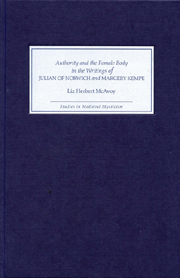Book contents
- Frontmatter
- Contents
- Dedication
- Acknowledgements
- Abbreviations
- Introduction
- 1 Motherhood and Margery Kempe
- 2 The Motherhood Matrix in the Writing of Julian of Norwich
- 3 Discourses of Prostitution and The Book of Margery Kempe
- 4 ‘3yf thowe be payede,’ quod oure lorde, ‘I am payede’: Hermeneutics of the Holy Whore in Julian of Norwich
- 5 Margery Kempe: Wisdom, Authority and the Female Utterance
- 6 Julian of Norwich: Voice of the Wise Woman
- Afterword
- Bibliography
- Index
3 - Discourses of Prostitution and The Book of Margery Kempe
Published online by Cambridge University Press: 12 September 2012
- Frontmatter
- Contents
- Dedication
- Acknowledgements
- Abbreviations
- Introduction
- 1 Motherhood and Margery Kempe
- 2 The Motherhood Matrix in the Writing of Julian of Norwich
- 3 Discourses of Prostitution and The Book of Margery Kempe
- 4 ‘3yf thowe be payede,’ quod oure lorde, ‘I am payede’: Hermeneutics of the Holy Whore in Julian of Norwich
- 5 Margery Kempe: Wisdom, Authority and the Female Utterance
- 6 Julian of Norwich: Voice of the Wise Woman
- Afterword
- Bibliography
- Index
Summary
Wynne whoso may, for al is for to selle.
By the time Chaucer came to write these words in the context of his depiction of the Wife of Bath in the late fourteenth century, the country was in the throes of major economic and social change. The Black Death of mid-century had brought about the loss of up to one half of the population in some areas and had contributed to what R. H. Britnell has identified as a ‘mid-century crisis’. During Margery Kempe's lifetime this population deficit had not recovered; on the one hand it had created a decline in the demand for certain commodities within the market, but on the other, it resulted in an increase in productivity in the urban centres to which people flocked from the rural areas in order to find more lucrative types of employment. Margery Kempe's attempts at commercial brewing and milling are testimony to the increased opportunities for women during this time of population decline, which released many people into social productivity who had previously lived on the most basic level of subsistence – although it is also true to say that many of the professions still remained closed to women. Between the 1360s and early 1400s, a time when Margery Kempe was being brought up in a relatively affluent and influential family in Bishop's Lynn, the standard of living rose considerably alongside the new commercial atmosphere in the towns and the importance of exports in East Anglia in particular was at its height.
- Type
- Chapter
- Information
- Publisher: Boydell & BrewerPrint publication year: 2004



